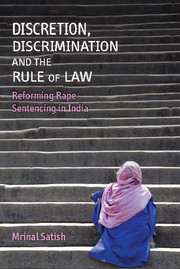Book contents
- Frontmatter
- Dedication
- Contents
- Acknowledgements
- Abbreviations
- 1 Introduction
- 2 An Introduction to the Indian Criminal Justice System
- 3 The Law and Practice of Rape Adjudication in India
- 4 Rape Sentencing: An Empirical Analysis
- 5 Myths and Stereotypes in Rape Prosecutions
- 6 Structuring Sentencing Discretion: Guideline Models and Approaches
- 7 Sentencing Discretion in India: The Need for Structuring
- 8 Sentencing Guidelines for Rape
- Appendix 1 List of Cases Studied for Empirical Analysis
- Appendix 2 Templates of Format Used for Medical Examination of Rape Victims
- Appendix 3 Overview of Variables Considered for Empirical Study and Data Obtained
- Appendix 4 Output of Regression Analysis
- Appendix 5 Charts
- Table of Cases
- Bibliography
- Index
7 - Sentencing Discretion in India: The Need for Structuring
Published online by Cambridge University Press: 23 July 2017
- Frontmatter
- Dedication
- Contents
- Acknowledgements
- Abbreviations
- 1 Introduction
- 2 An Introduction to the Indian Criminal Justice System
- 3 The Law and Practice of Rape Adjudication in India
- 4 Rape Sentencing: An Empirical Analysis
- 5 Myths and Stereotypes in Rape Prosecutions
- 6 Structuring Sentencing Discretion: Guideline Models and Approaches
- 7 Sentencing Discretion in India: The Need for Structuring
- 8 Sentencing Guidelines for Rape
- Appendix 1 List of Cases Studied for Empirical Analysis
- Appendix 2 Templates of Format Used for Medical Examination of Rape Victims
- Appendix 3 Overview of Variables Considered for Empirical Study and Data Obtained
- Appendix 4 Output of Regression Analysis
- Appendix 5 Charts
- Table of Cases
- Bibliography
- Index
Summary
Introduction
Earlier in this book, I made a case for structuring rape sentencing in India. In the preceding chapter, I examined guideline models that have been used for structuring sentencing discretion in various jurisdictions across the world. In this chapter, I shall endeavour to provide a framework for structuring sentencing discretion in India. In the next Chapter, I apply the suggested framework to rape sentencing. This chapter is divided into three sections. In Section II, I analyse whether the existing sentencing framework passes constitutional muster. Drawing on definitions and analyses of discretion provided by scholars and courts, including the Supreme Court of India, I argue that present sentencing practices in Indian courts often constitute an inappropriate exercise of discretion – that is, an abuse of discretion. By abuse of discretion, I mean that courts have failed to employ proper reasoning, based on legal principles, in making sentencing decisions. I then analyse rulings of the Supreme Court of India interpreting Article 14 of the Constitution of India, which guarantees equality before the law and equal protection of the laws. Based on the Court's jurisprudence on Article 14, I argue that the exercise of unbridled sentencing discretion violates Article 14, and hence is unconstitutional. I further argue that by virtue of not providing guidelines for exercise of discretion, the existing sentencing framework under the Indian Penal Code falls foul of the due process protection guaranteed by Article 21 of the Constitution of India, as well.
In Section III, I suggest a framework for restoring constitutionality to sentencing. Inasmuch as eliminating all discretion is neither feasible nor advisable, I examine various methods of dealing with discretion and conclude that the solution is to structure sentencing through enactment of sentencing guidelines. I propose that Parliament enact a sentencing law that establishes a full-time sentencing commission with the responsibility of drafting sentencing guidelines. I discuss the structure of the proposed Commission and the nature and content of sentencing guidelines that must be framed by it.
The Constitutionality of the Current Indian Sentencing Framework
Defining discretion
My primary argument in this section of the chapter is that sentencing discretion, as is currently exercised by Indian courts, is unconstitutional.
- Type
- Chapter
- Information
- Discretion, Discrimination and the Rule of LawReforming Rape Sentencing in India, pp. 161 - 186Publisher: Cambridge University PressPrint publication year: 2016



